|
|
|
Sort Order |
|
|
|
Items / Page
|
|
|
|
|
|
|
| Srl | Item |
| 1 |
ID:
130716
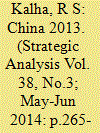

|
|
|
|
|
| Publication |
2014.
|
| Summary/Abstract |
It is a matter of widespread belief that on assumption of supreme power, Chinese leader Xi Jinping's overall ambition was to emerge as an iconic figure in the same league as Mao Zedong and Deng Xiaoping. At the very outset, Xi realised this would necessitate the elimination of any political challenge and his first step was therefore to consolidate an unassailable position within the Standing Committee of the Party Politburo (PBSC). To achieve this objective, Xi chose to emulate some of the policies and methods of the late Mao Zedong, albeit with modern underpinnings.
|
|
|
|
|
|
|
|
|
|
|
|
|
|
|
|
| 2 |
ID:
130717
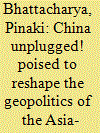

|
|
|
|
|
| Publication |
2014.
|
| Summary/Abstract |
Within the first year of Xi Jinping's elevation to the presidency, China has moved further ahead on its path to achieving primacy in the world. In the last week of November 2013, Beijing imposed an Air Defence Identification Zone (ADIZ) over the conflicted Diaoyu/Senkaku Islands in the East China Sea, much to the consternation of its feuding neighbours such as Japan and South Korea. Their howls of protest found expression in the US attempt to challenge China to promulgate what it has done in deed.
|
|
|
|
|
|
|
|
|
|
|
|
|
|
|
|
| 3 |
ID:
130721
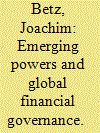

|
|
|
|
|
| Publication |
2014.
|
| Summary/Abstract |
The traditional mode of governance of national and global monetary and financial markets was obviously too weak and piecemeal to hinder the recurrent outbreak of regional and worldwide crises. The latest and gravest in this series triggered a massive institutional and operational overhaul, achieved both by the creation of new institutions and also by old and new ones being made stronger and more inclusive, foremost by introducing major emerging countries into their steering and oversight bodies. During this endeavour, national and institutional self-interests were initially subdued, but would come out forcefully later. As a consequence, the new edifices for multilateral market regulation and surveillance, as well as its financing, went only as far as the difficult compromise of an enlarged body of players would allow. Therefore, regional solutions or cooperation between like-minded countries were often seen as alternatives to a strong multilateral understanding, but are only able to complement the existing international monetary and financial system.
|
|
|
|
|
|
|
|
|
|
|
|
|
|
|
|
| 4 |
ID:
130725


|
|
|
|
|
| Publication |
2014.
|
| Summary/Abstract |
The German government's 2011 abstention from the United Nations Security Council vote on military intervention in Libya raised questions about Germany's role in the international system. By abstaining, Germany broke with its Western allies and aligned itself with four of the BRICS countries: Brazil, Russia, India and China. Its 'non-Western' act unleashed a debate on the future of German foreign policy. This contribution aims to provide an understanding of Germany's new foreign policy. It characterises some basic political developments, outlines recent German academic debates about the character of German foreign policy and provides an interpretation of the government's New Players Concept ('Shaping Globalization - Expanding Partnerships - Sharing Responsibility'), which was adopted in 2012.
|
|
|
|
|
|
|
|
|
|
|
|
|
|
|
|
| 5 |
ID:
130722


|
|
|
|
|
| Publication |
2014.
|
| Summary/Abstract |
A discordant political relationship, three and a half wars and Pakistan's material support for secessionist militants in the border states of Punjab and Jammu and Kashmir compelled India to harden its international border with Pakistan. An inward-looking economy and the absence of an imperative for regional economic integration also resulted in restricted movement of people and goods across the border. However, in the past decade or so, an emergent Indian economy coupled with both countries' desire to engage themselves constructively have paved the way for softening the border. As the India-Pakistan border gradually opens up for increased trade and travel, a number of issues such as infiltration by terrorists and militants, cross-border shelling and sniping, trafficking of drugs and arms and so on pose a challenge to the effective management of the border. Moreover, inadequate manpower, lack of resources and inadequate cooperation from Pakistan make management of the border difficult. As a result, India has to continuously balance the imperatives of maintaining the border as a barrier against cross-border terrorism with softening it to enable the regulated flow of trade and travel.
|
|
|
|
|
|
|
|
|
|
|
|
|
|
|
|
| 6 |
ID:
130719


|
|
|
| 7 |
ID:
130715
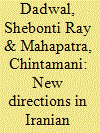

|
|
|
|
|
| Publication |
2014.
|
| Summary/Abstract |
After the June 2013 election when Hassan Rouhani became president of Iran, Iranian foreign policy changed course. The fundamental transformation is the result of his decision to open up a fresh dialogue with the United States and other Great Powers to resolve the nuclear stand-off that would end the country's isolation, lift the biting US-led sanctions and allow Iran to open a new chapter in its economic policy and international diplomacy.
|
|
|
|
|
|
|
|
|
|
|
|
|
|
|
|
| 8 |
ID:
130718


|
|
|
|
|
| Publication |
2014.
|
| Summary/Abstract |
Elections for the Northern Provincial Council (NPC) of Sri Lanka were held on September 21, 25 years after they were first held in 1988 under the Thirteenth Amendment (13A) to the Sri Lankan Constitution, which formed part of the Indo-Lanka Accord. It was, however, the first election since the demerger of the Northern and Eastern Provinces in 2006.1 With the end of 30 years of war that had culminated in the elimination of the Liberation Tigers of Tamil Eelam (LTTE), election to the NPC was politically crucial for the Tamils, especially in the post-war context. Moreover, the devolution debate has become increasingly politicised in Sri Lanka, where the victory of the government, i.e. of the Sinhala majority, through war is projected as the end of the conflict and has been equated to the end of terrorism. The defeat of the LTTE has brought an end to terrorism and their espousal of separatism. Many ultra-nationalists represented by Jathika Hela Urumaya (JHU), Janatha Vimuki Perumuna (JVP) and so on even argue that demand for autonomy is no longer an agenda for the majority. It has come to imply that the Tamils must accept the position of secondary citizens. In short, what they lost through war cannot be gained through negotiation and nothing should be conceded.
|
|
|
|
|
|
|
|
|
|
|
|
|
|
|
|
| 9 |
ID:
130724
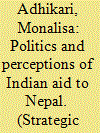

|
|
|
|
|
| Publication |
2014.
|
| Summary/Abstract |
India has significantly invested in Nepal's development through economic assistance since 1952. Despite deploying aid to win the hearts and minds of the people of Nepal, India has not entirely succeeded in doing so. Paradoxically, an analysis of Indian aid and gaps in the planning, processes, modalities and perceptions of India's motivation shows that it has possibly contributed to the fuelling of anti-India sentiments among the Nepalese population. Although Indian aid has not been refused, it has been resisted, and sceptical nationalist sentiments dominate perceptions of Indian aid in Nepal. Why is India not perceived as a major donor despite providing significant aid? Why do vested political and economic interests mar the public perception of Indian aid to Nepal? This article is an attempt to reconstruct the history of India's developmental aid to Nepal, outline the trends, shifting priorities and modalities as well offering a critical analysis of the perceptions of Indian aid. The article is limited to development aid and excludes military aid and investments.
|
|
|
|
|
|
|
|
|
|
|
|
|
|
|
|
| 10 |
ID:
130726
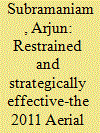

|
|
|
|
|
| Publication |
2014.
|
| Summary/Abstract |
The winter of 2011 was a dramatic period for air power in Mediterranean Europe and India. Operation Unified Protector (OUP), the successful North Atlantic Treaty Organisation (NATO) offensive aerial campaign that paved the way for a regime change in Libya, involved two platforms that had been shortlisted for the largest fighter aircraft deal of recent times. In the race for the 126 Medium Multi-Role Combat Aircraft (MMRCA) for the Indian Air Force (IAF), both the Eurofighter Typhoon and Dassault Rafale-platforms that were well exploited during the Libyan campaign-had been shortlisted over the much fancied US fighters, the F-18 and the F-16. Taking note of the highly professional conduct of the IAF during the flight trials, both the UK and France attempted to woo the IAF by showcasing the capabilities of the aircraft and other enabling platforms against the backdrop of their successful employment in diverse roles during OUP from March to October 2011. Numerous presentations were made at various seminars in New Delhi by Royal Air Force (RAF) and French Air Force (FAF) operational commanders who had taken part in the campaign, both at operational and tactical levels.
|
|
|
|
|
|
|
|
|
|
|
|
|
|
|
|
| 11 |
ID:
130720


|
|
|
|
|
| Publication |
2014.
|
| Summary/Abstract |
Democracy has spread spontaneously and swiftly in an area of the world generally thought to be immune to political changes: West Asia and North Africa (WANA). An incident of common occurrence in Third World countries-a policeman extorting money from a fruit vendor-sparked this surge for democracy, which spread rapidly from the Mediterranean to the Red Sea in some two months. On December 17, 2010, a fruit vendor, Mohammed Razzack, set himself on fire to protest against a policeman extorting money from him. From Tunisia to Egypt (which witnessed the end of the 33-year military dictatorship) the surge for democracy spread to Yemen (another seat of repressive military dictatorship). From the Mediterranean to the Red Sea was the geographic spread of this sweep-a rare occurrence in history.
History has recorded some such wide political sweeps. The 1848 second revolution began in Paris and reached St. Petersburg, Russia, in a few short months, sweeping away the authoritarian monarchies of Central Europe and severely shaking the Czarist autocracy. Remarkable was the democratic upsurge that led to the fall of the old Stalinist dictatorship in East Europe; Communist Party dictatorships crumbled in Poland, Hungary and Czechoslovakia. The Berlin Wall was dismantled peacefully by the German people in November 1989. The deadliest Cold War confrontation in history ended most peacefully.
|
|
|
|
|
|
|
|
|
|
|
|
|
|
|
|
|
|
|
|
|